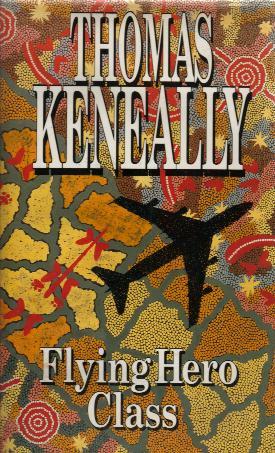
Thomas Keneally
1991

|
Flying Hero Class Thomas Keneally 1991 |
Dustjacket synopsis:
"Moral dilemmas have long been the stuff of Thomas Keneally's stimulating and thought-provoking
fiction. In Flying Hero Class, hijackers representing a Palestinian faction take over
an airliner between New York and Frankfurt. But nothing is straightforward. If the hijackers
think they can make their political point using a planeload of western capitalists en route for
the financial centre of Europe they now have to consider one particular group of passengers
who may identify with their cause even though from another side of the world.
"By their names you shall know them: Bluey Kannata, Whitey Wappitji, Paul Mungina, Philip Puduma and Tom Gullagara are all members of the Barramatjara Dance Troupe - Australian Aborigines on a world tour. How will they react to the hijackers? Why do the hijackers choose them, together with a Japanese-American Republican from Budapest, Arizona named Daisy Nakamura, to share a place of honour in the captured plane? And how does each feel when their white Australian manager is singled out for the hijackers' abuse because the dance troupe's sponsors are accused in the Press of being funded by the CIA?
"As the airliner, governed by the passionately motivated hijacker Taliq, seeks landing-places throughout the Mediterranean, Keneally observes how his characters react under pressure, hijackers and hijacked alike. With shifts and stratagems which show him to be a master of the sort of pace normally associated with the thriller, Keneally brings his new novel to an astonishing end."
First Paragraph:
It always surprised the troupe manager, Frank McCloud, how calmly they sat. In their big first-class seats, all of them, even tormented Bluey Kannata, looked as self-contained as rich children. They had conquered New York, and it was hard to know what that meant to them. Now they were going - composedly - to Frankfurt. There the full-colour programmes had already been printed up in a language Whitey Wappitji and the others had no familiarity with.
The troupe were calm about that venue too. Here, at the start of their flight, they were suffering no pre-performance trembles for the sake of Frankfurt. They never seemed to hold any narrow post-mortems that McCloud could see, or blame each other for mistakes on stage. They didn't worry about the perversity or mental blinkers of critics.
From the Hodder & Stoughton hardback edition, 1991.
This page and its contents are copyright © 1998-2005 by Perry Middlemiss, Melbourne, Victoria, Australia.
Last modified: October 18, 2005.